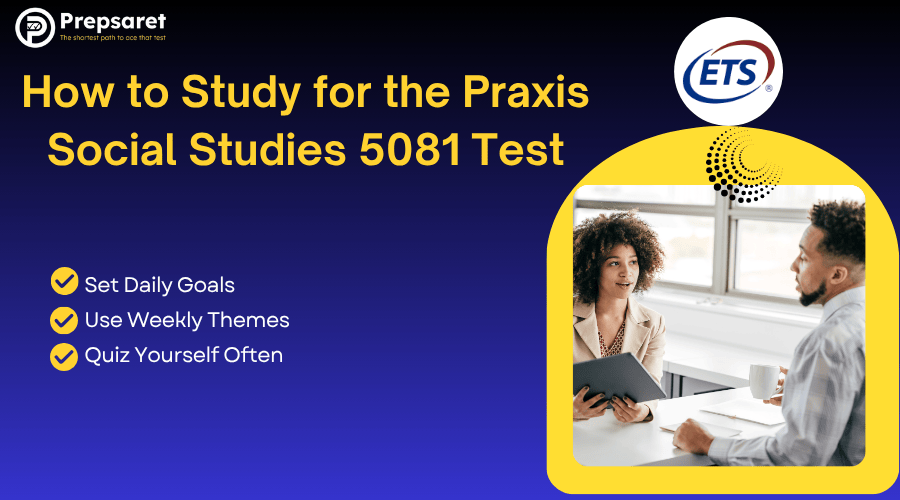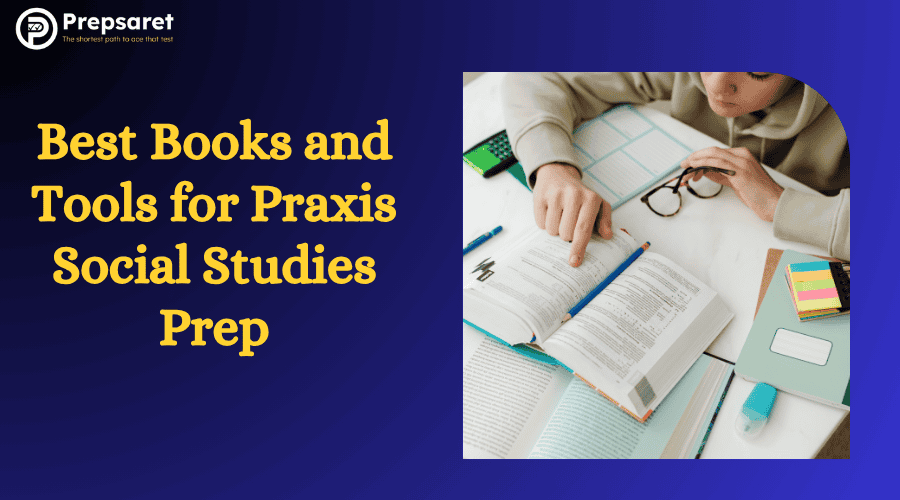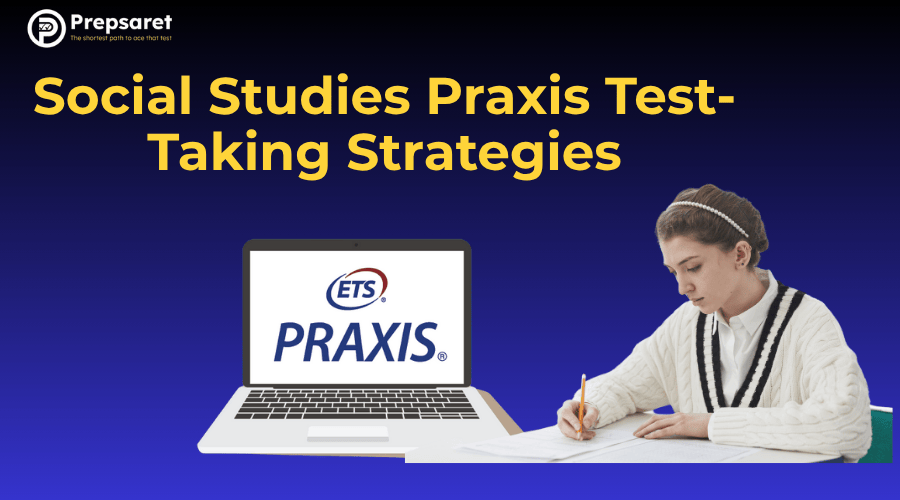If you’re aiming to become a certified teacher, the Praxis Social Studies exam is a crucial step. It tests your understanding of key subjects like history, geography, civics, and economics—all essential for success in the classroom.
One of the best ways to prepare is by taking a practice test. It helps you get familiar with the exam format, reduces test-day anxiety, and builds the confidence you need to perform at your best.
That’s where this guide comes in. We’ll walk you through everything you need to know to prepare effectively and pass with confidence.
At Prepsaret, we offer realistic practice questions that closely mirror the actual exam. This means your study time is focused, your confidence grows, and you maximize your chances of passing on your first attempt.
Overview of the Praxis Social Studies Exams
The Praxis Social Studies tests come in two major formats: the 5004 and 5081 exams. Each one serves a different purpose depending on what grade level you plan to teach.
Praxis Social Studies 5004
The Praxis 5004 is a subtest of the Elementary Education: Multiple Subjects exam, specifically designed for those seeking to teach at the elementary level. It covers foundational concepts in U.S. and world history, government, geography, economics, anthropology, and sociology.
The test consists of 60 multiple-choice questions divided into three main content categories:
- United States History, Government, and Citizenship
- Geography, Anthropology, and Sociology
- World History and Economics
The exam duration is 60 minutes and emphasizes a broad understanding of basic social studies principles appropriate for elementary education.
Praxis Social Studies 5081
The Praxis 5081 exam is intended for those who plan to teach social studies at the middle or high school level. It is more comprehensive and in-depth than the 5004, requiring a broader and deeper understanding of social studies concepts.
Content areas include U.S. history, world history, government/civics/political science, geography, economics, and behavioral sciences.
The test consists of 130 selected-response questions with a time limit of 2 hours.
In summary, the 5004 exam evaluates basic proficiency needed for teaching young learners, while the 5081 is designed to assess the more advanced knowledge required for teaching social studies at secondary education levels.
Check Out: Praxis Practice Test
How to Prepare for the Social Studies Teacher Certification Exam
To prepare, most teachers start with a Praxis II Social Studies practice test to understand the structure and scope of the test. A strong foundation can be built with a Praxis 5081 Social Studies exam study plan that includes weekly topic goals, consistent review, and practice tests.
Thinking about secondary teaching? You’ll likely take the Praxis test for history teachers, which is part of the 5081 series. The exam assesses your understanding of major historical themes and your ability to analyze sources. A Praxis 5081 practice test can help you simulate real testing conditions and reduce test anxiety.
The Social Studies teacher certification exam is a key milestone in your teaching journey. Understanding the test’s content, structure, and expectations will help you perform at your best.
How to Study for the Praxis Social Studies 5081 Test
Wondering how to study for the Praxis Social Studies 5081 test effectively? Success starts with a structured plan that is consistent, flexible, and tailored to your learning style.
Here’s a practical routine to help you stay focused:
- Set Daily Goals: Dedicate 30–60 minutes each day to a specific subject area, such as U.S. history, civics, or economics.
- Use Weekly Themes: Organize your study plan around themes (e.g., “World History Week” or “Civics and Government Week”) to deepen your understanding.
- Review Regularly: Schedule short review sessions every 2–3 days to reinforce what you’ve learned.
- Quiz Yourself Often: Use flashcards or take quick quizzes to test your memory and identify weak spots.
- Track Your Progress: Maintain a checklist or progress chart to keep yourself accountable and motivated.
To get started, try using Praxis exam practice free resources. These tools are perfect for reviewing content when you’re on a budget—just ensure they come from reputable sources.
Enrolling in a Praxis test prep online course can also give you a major boost. These programs often include video lectures, expert tips, and practice questions that mirror the real exam.
For on-the-go learning, download Social Studies Praxis II questions and answers PDF files. They’re ideal for self-testing during study breaks or commutes and can help you reinforce key concepts offline.
Free and Paid Study Resources That Work
When preparing for the Praxis exam, many test-takers wonder whether to use free resources or invest in paid materials. The most effective approach is often a combination of both, allowing for broad exposure to content and targeted skill-building.
Social Studies Praxis Free Study Tools
Free resources are a great starting point, especially for gaining familiarity with the exam format. Consider these options:
- A Social Studies Praxis practice test free version gives you access to sample questions modeled after the real exam.
- Some platforms provide a Social Studies Praxis practice test with answers, helping you learn from mistakes and identify weak areas.
- Downloadable formats, such as a Social Studies Praxis practice test PDF free, are useful for offline review and flexible studying.
- A free Social Studies Praxis practice test with answers is ideal for reviewing content with a study partner or small group sessions.
Among these resources, Prepsaret offers free Social Studies Praxis practice questions that closely reflect the question style used by ETS, the official test provider. These free questions are great for early-stage preparation and quick topic reviews.
However, for more comprehensive preparation, it’s highly recommended to explore Prepsaret’s paid version, which includes full-length exams, detailed answer explanations, performance tracking, and adaptive study plans.
This level of support can make a significant difference in helping you pass your Praxis exam on the first attempt.
Check Out: Free Praxis Practice Test
Social Studies Praxis Paid Resources
While free tools offer accessibility, paid resources provide structure, depth, and personalized feedback—critical components of efficient test prep.
Prepsaret offers the best Social Studies Praxis practice questions, specifically designed to reflect the format, difficulty, and style of the actual exam. Key features include:
- Full-length practice exams that simulate the real testing experience
- Detailed answer explanations to help you understand the reasoning behind each question
- Performance tracking so you can monitor progress over time and target weaker areas
- Adaptive study plans that adjust based on your performance and learning needs
In addition, Prepsaret’s resources are regularly updated to align with the most current Praxis standards, making it a top choice among the best websites for Social Studies Praxis test prep.
Combining high-quality free resources with Prepsaret’s premium tools gives you the best of both worlds—broad exposure and targeted mastery—putting you in the strongest position to pass your exam with confidence.
Best Books and Tools for Praxis Social Studies Prep
If you’re committed to passing the Praxis Social Studies exam, selecting the right preparation tools is essential. The following resources are highly recommended by experienced test-takers:
- Best Praxis Social Studies prep book: Choose a book that is updated to match the latest test blueprint. The best ones include comprehensive content reviews, full-length practice exams, test-taking strategies, and answer explanations.
- Praxis Social Studies study guide: Look for a guide that breaks down complex topics into manageable sections and includes end-of-chapter quizzes for quick assessments.
- Online Praxis Social Studies test prep course: A structured course can provide accountability, video instruction, and flexible scheduling—ideal for those balancing study with work or other commitments.
- Sample questions for Social Studies Praxis test: Regularly practicing with sample questions helps improve your speed, accuracy, and familiarity with test formats.
In addition to traditional materials, supplemental tools such as mobile apps, flashcard apps, and educational YouTube channels can enhance your study routine.
Combining these resources ensures a well-rounded preparation strategy that addresses different learning styles and improves overall exam readiness.
Taking the Praxis 5004 and 5081 Practice Tests
Repetition and realistic practice are key to exam success. Taking a Social Studies Praxis practice test 5004 or 5081 helps you build confidence, improve timing, and identify weak areas.
Simulate Real Test Conditions
For best results, treat each practice test like the real exam:
- Use a timer and follow actual time limits
- Complete the test in one sitting to build stamina
- Avoid checking answers during the test—review afterward
- Use a Social Studies Praxis practice test PDF for easy printing and group study sessions
For Secondary-Level Test Takers
If you’re preparing for the 5081 exam, start with a Praxis 5081 practice test free to assess your readiness. These free tests are great for spotting content gaps early on.
Prepsaret also offers a high-quality Social Studies Praxis practice test free 5081, designed to match the structure, content, and difficulty of the actual exam.
How to Pass the Praxis Social Studies Test on the First Try
Passing the Praxis Social Studies test on your first attempt is achievable with the right strategy, consistent effort, and a positive mindset.
Praxis Social Studies Test Difficulty Level
First, it’s important to understand the difficulty level of the exam you’ll be taking. The 5004 exam, designed for elementary educators, covers broad foundational topics, while the 5081 exam for secondary teachers demands a deeper and more comprehensive knowledge of social studies.
Both require a strong grasp of content and solid test-taking skills.
Know Your Target Score
What is the passing score for Praxis Social Studies? Scores vary by state, typically ranging from:
- 155-165 for the 5004 exam
- 157-162 for the 5081 exam
For the Praxis 5004 (Elementary Education: Social Studies) exam, most states set the passing score at 155. However, there are exceptions: for example, South Dakota requires 147, Kentucky 148, and the Northern Mariana Islands 157.
For the Praxis 5081 (Social Studies: Content Knowledge) exam, the passing score ranges from 146 to 162 depending on the state. For instance, Colorado requires 150, but some states set it as low as 146 or as high as 162.
Check Out: How Praxis Scoring Works
Building Content Mastery
Once you know your target, focus on mastering the essential content areas, including:
- U.S. History: Major events and movements
- World History: Key civilizations and cultural developments
- Geography: Physical features and spatial relationships
- Civics and Government: Constitutional principles and political processes
- Economics: Basic concepts and market systems
Strengthening these areas forms the foundation of your success.
Social Studies Praxis Test-Taking Strategies
Alongside content mastery, effective test-taking strategies make a significant difference. Using Praxis II practice questions is an excellent way to hone these skills.
For multiple-choice questions, make sure to:
- Read carefully and identify keywords
- Eliminate clearly incorrect answers
- Select the “most correct” option
- Trust your first instinct
For constructed response questions, it’s helpful to:
- Plan before writing
- Address every part of the question
- Support your points with examples
- Manage your time wisely
Managing Test Anxiety
Even with preparation, anxiety can affect performance. To stay calm and focused:
Before test day:
- Practice deep breathing and visualization
- Maintain good sleep and health habits
On test day:
- Arrive 15-20 minutes early
- Bring approved snacks and water
- Use positive self-talk
- Take deep breaths if needed
Mastering Time Management
Time management is crucial to success. Be sure to:
- Know the time allotted per section
- Avoid spending too long on tough questions
- Mark and return to difficult items
- Save time for review if possible
Final Week Preparation
In the last week before the test:
- Take a full-length practice test early on
- Focus your review on weak areas
- Avoid learning new material
- Concentrate on test strategies and confidence building
- Prepare all your test day materials in advance
Test Day Tips
On the big day, follow these tips:
- Get 7-8 hours of sleep
- Eat a nutritious breakfast
- Dress comfortably in layers
- Bring your ID and necessary materials
- Stay positive and trust your preparation
If You Don’t Pass
If the outcome isn’t what you hoped for, don’t lose heart. Many successful teachers pass after multiple attempts. Use your score report to identify weak spots, adjust your study plan accordingly, and try again. Each experience strengthens your skills and test-taking confidence.
Sample Questions for Social Studies Praxis Test
Let’s try two example questions from a Social Studies Praxis Practice Test:
Question 1:
What was one of the key outcomes of the Treaty of Versailles?
A. It ended the American Civil War
B. It granted independence to India
C. It imposed reparations on Germany after WWI
D. It created NATO
Correct Answer: C. It imposed reparations on Germany after WWI
Explanation:
The Treaty of Versailles, signed in 1919, officially ended World War I. One of its key provisions was that Germany was required to accept responsibility for the war and pay reparations to the Allied countries. These reparations aimed to compensate for the extensive damage caused during the war and were a major factor in Germany’s economic difficulties during the 1920s and 1930s.
Why the other options are incorrect:
- A. It ended the American Civil War: The American Civil War ended in 1865, long before the Treaty of Versailles was signed. The treaty relates to World War I, not the Civil War.
- B. It granted independence to India: India gained independence from British rule in 1947, decades after the Treaty of Versailles. The treaty did not address colonial independence.
- D. It created NATO: NATO (the North Atlantic Treaty Organization) was established in 1949, after World War II, and is unrelated to the Treaty of Versailles.
Question 2
What system divides power between national and state governments?
A. Confederation
B. Unitary
C. Monarchy
D. Federalism
Correct Answer: D. Federalism
Explanation:
Federalism is a system of government in which power is divided between a central (national) government and smaller political units such as states or provinces. This division allows each level of government to have certain powers independent of the other, balancing authority and promoting shared governance.
Why the other options are incorrect:
- A. Confederation: A confederation is a loose alliance of independent states where most power remains with the states, and the central government has limited authority. This is different from federalism, where power is constitutionally shared.
- B. Unitary: A unitary system centralizes all power in the national government, with little or no power delegated to local governments.
- C. Monarchy: A monarchy is a form of government ruled by a king or queen, which does not specifically define the division of governmental power between national and regional levels.
For more sample questions, check out Prepsaret’s Social Studies Praxis Practice Test resources.
Social Studies Praxis Practice Test: FAQs
How Many Questions Are On The Praxis Social Studies Practice Test?
The Praxis Social Studies: Content Knowledge (5081) exam contains 130 selected-response questions with a 2-hour time limit.
What Topics Are Covered On The Praxis Social Studies Exam?
The exam covers six content areas: U.S. History (20%), World History (20%), Government/Civics/Political Science (20%), Geography (15%), Economics (15%), and Behavioral Sciences (10%).
Where Can I Find Free Praxis Social Studies 5081 Practice Tests?
Free Praxis 5081 practice tests are available on sites like Prepsaret, and the official ETS Praxis website.
What Is A Passing Score For The Praxis Social Studies Test?
Passing scores vary by state, but generally a scaled score around 162 is required for the 5081 exam. Check your state’s specific requirements for accuracy.
Conclusion: Practice, Prep, and Pass with Confidence
Your dream of becoming a teacher starts with passing the Social Studies Praxis Practice Test. With the right tools, a solid plan, and consistent practice, you’re already on your way. Use trusted resources like Prepsaret to build confidence and familiarity with the test format. Remember, the more you practice, the more you grow. Now take a deep breath, trust yourself, and crush that Social Studies Praxis Practice Test.




